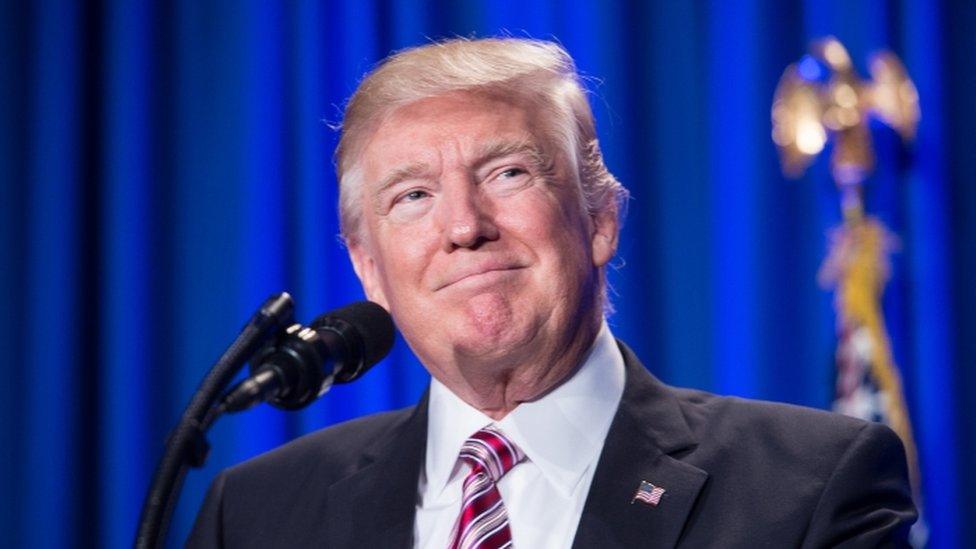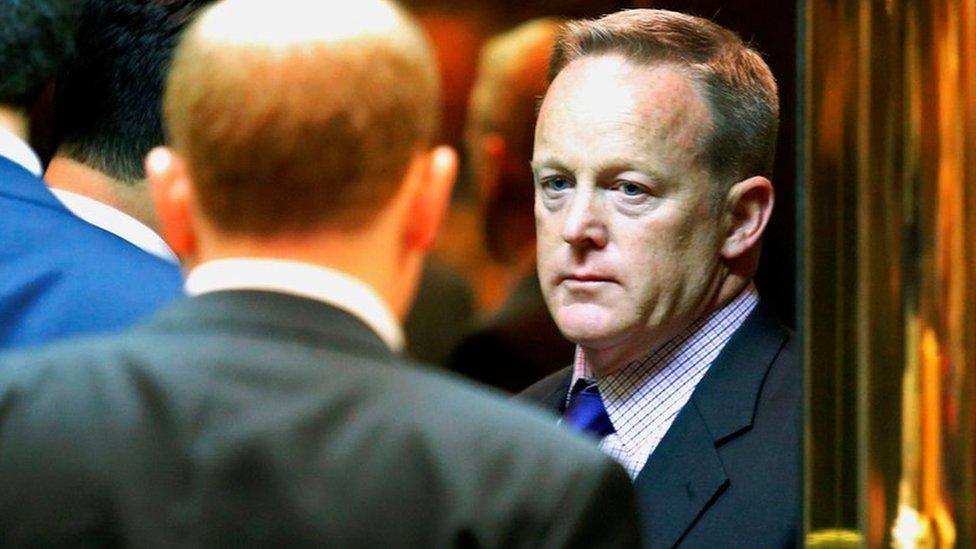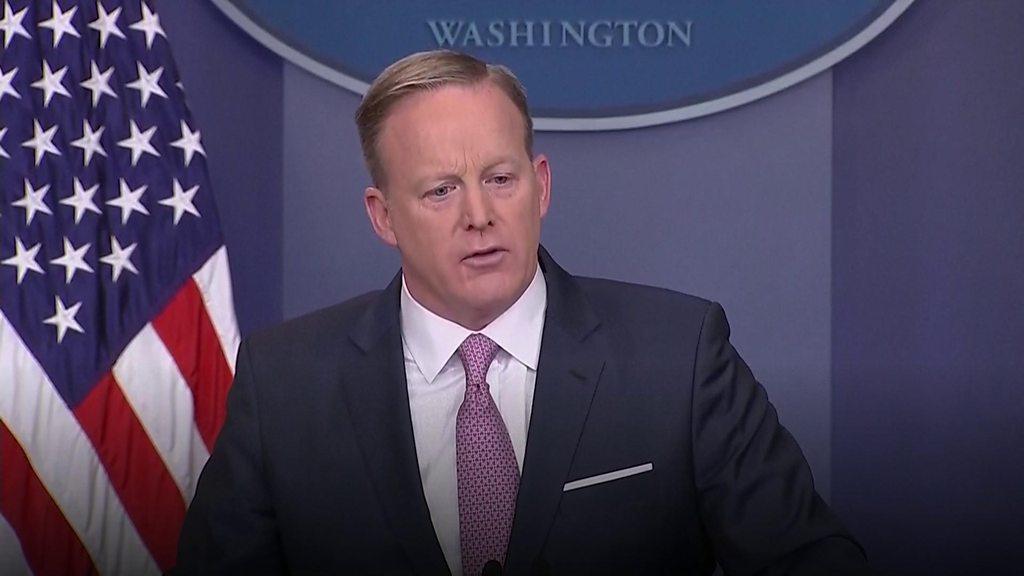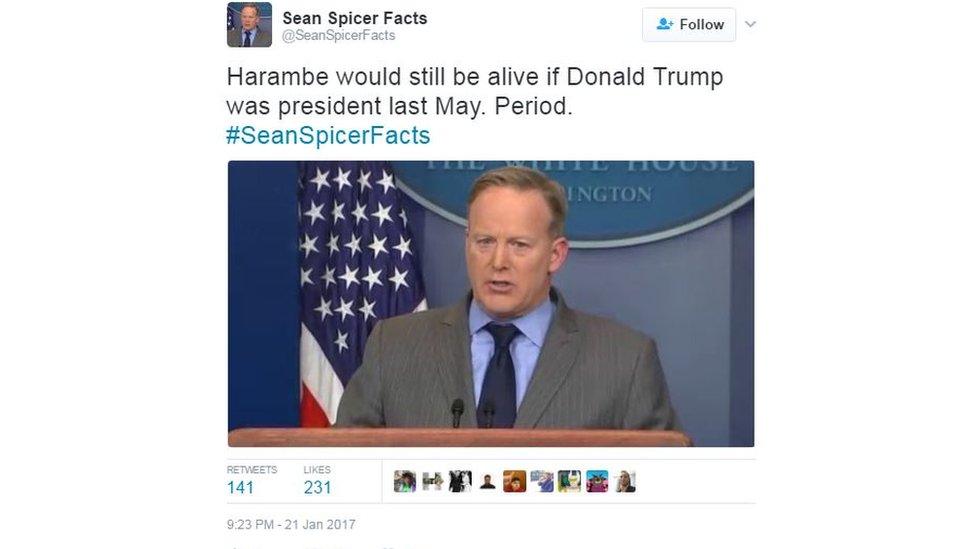The Spicer Doctrine: Holding the press to account
- Published
Sean Spicer: "We can disagree with the facts"
Some journalists are scum, many are incorrigible egoists, and yet the vast majority, in my experience, are decent coves with a high-minded view of the trade they belong to.
Whether they report on the courts, local football matches, or the latest film openings, part of the job is spreading knowledge and joy - or, as Lord Reith put it, to "inform, educate and entertain."
But there is a deeper attraction to the trade.
This is the principle of holding power to account.
Obviously many journalists fall short of achieving this.
Some become corrupted by power themselves.
But journalism at its best is the industrialisation of scrutiny.
The presence of mischievous, determined, nosy hacks stops people who have immense power - some of it unjustifiably, arbitrarily or illegally obtained - from getting away with misdeeds.
You might think that's pompous, but, frankly, I don't mind.
Nor, I'm sure, do the White House press corps who were assembled for the astonishing press conferences that Sean Spicer, new press secretary to President Trump, gave earlier this week.
Huge consequences
I'm not interested, for the purposes of this blog, in whether or not the assertions made by Mr Spicer were true or false.

President Trump wants to take his message "directly to the American people"
I am interested in these words he uttered, the consequences of which are immense for politics, media and public life: "There's been a lot of talk in the media about the responsibility to hold Donald Trump accountable.
"And I'm here to tell you it goes two ways.
"We're going to hold the press accountable, as well.
"The American people deserve better.
"And as long as he serves as the messenger for this incredible movement, he will take his message directly to the American people, where his focus will always be".
Put aside the almost biblical imagery and the clear indication that, through talk radio and social media, President Trump will cut out journalists and go straight to voters.
Those four words "it goes two ways" are doing a lot of work there.
In fact, they're re-inventing government."
Last night, Steve Bannon, the former chief of Breitbart News, went even further than Spicer in an interview with The New York Times., external He said: "The media should be embarrassed and humiliated and keep its mouth shut and just listen for a while."
As one of the most powerful voices in Trump's ear, clearly Bannon's view that the media should be subject to ferocious scrutiny now holds considerable sway in the White House.
Five thoughts
I have decided to call, external this notion that it is the job of government to hold the press to account The Spicer Doctrine. Here are five thoughts about it:
One: Totalitarian states use propaganda to control public information, spread fear and rally support against external foes.
Donald Trump has a powerful democratic mandate: he is no totalitarian.
But he seems immensely frustrated at his inability to control public information - so much so that he uses Twitter to circumvent the media, and sent out his spokesman to lambast and threaten journalists.
President Trump and Mr Spicer will soon find out that, especially in the digital age, they have no hope of controlling public information.
The internet is a mad bazaar.
There will always be stuff that annoy this administration and send them into a fury.
So expect more individual journalists to suffer the fate of the Time magazine journalist who got his facts wrong, external.
Two: There is a serious question of credibility and trust at stake here.
As promised, I won't pass judgement here on the veracity of the statements Mr Spicer is making.
But in just his first week as president, Mr Trump has obliterated the basic faith that many Americans had that what the White House says is true.
You might argue that this faith was decimated by the Iraq War.
It had, however, been rebuilt since.
And the issue isn't whether anyone believes Mr Spicer when he says Mr Trump's inauguration was better attended than Barack Obama's.
The problem will arise when he says something more substantial about a terror threat or America's next war.
Who will believe him then?
Does it matter if the press corps, who relay his message to millions of Americans, think he's not credible?
Three: The traditional media is caterwauling about Mr Trump's fondness for exaggeration.
Do his supporters care? Possibly not.
Where do Donald Trump supporters get their news from?
The fact is, with Fox News and various internet outlets supporting his cause, Mr Trump believes that the nationalist media who so helped him to win the presidency are also on board now.
Interestingly, as a president he seems to have made little effort to unify the country: instead, he seems intent on energising his base.
And that base cares less and less for the - as they see it - pompous bloviating of coastal correspondents and editors.
Four: While journalists at that same traditional media are outraged by The Spicer Doctrine, seeing it as an affront to natural justice, their colleagues in the commercial department are delighted.
Frankly, Mr Trump's relationship with the traditional media, while hateful, is a marriage of convenience.
Subscriptions to the Hillary-Clinton-endorsing New York Times have rocketed, external.
Ratings at CNN are up.
Traffic at Buzzfeed is soaring.
It turns out that the "two way" process Mr Spicer mentioned is a case of you scratch my back, I'll scratch yours.
This is a theme I shall be returning to.
Five: In one sense, democratic governments have always tried to regulate the media while paying lip service to media freedom and plurality.
After all, government designs the laws under which media operate.
But government is too hard, too complicated, and too relentless to accommodate a war against traditional media outlets.
Just as opponents of torture argue that co-operation is the better route to good intelligence, so a constructive and open relationship between government and media is better for both, so long as there is honesty about conflicting interests.
Right now, The Spicer Doctrine is a useful way of energising the roughly half of Americans who backed Mr Trump.
Soon enough, it could be bad for democracy, by wasting government time, preventing proper scrutiny, and filling cyberspace with sound and fury that signify nothing - of which there is no shortage of supply already.
- Published22 January 2017

- Published23 January 2017

- Published23 January 2017
